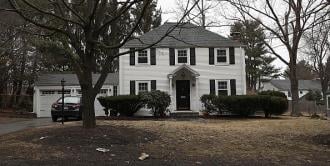You have /5 articles left.
Sign up for a free account or log in.

Peter Brand's former house
Suzanne Kreiter/The Boston Globe via Getty Images
A former coach of fencing at Harvard University was cleared Wednesday of charges that he took a bribe from the wealthy father of two students to have them admitted.
Peter Brand, the former coach, was charged under federal law with accepting bribes to get the two sons of Jie (Jack) Zhao admitted to the university. Zhao, who was charged with making the bribes, was also acquitted Wednesday.
A Justice Department statement in 2020, at the time of Brand’s and Zhao’s arrests, said, “In total, Zhao made $1.5 million in payments to Brand, or for Brand’s personal benefit, even as Brand recruited Zhao’s younger son to the Harvard fencing team. Zhao allegedly paid for Brand’s car, made college tuition payments for Brand’s [older] son, paid the mortgage on Brand’s Needham residence, and later purchased the residence for well above its market value, thus allowing Brand to purchase a more expensive residence in Cambridge that Zhao then paid to renovate. Zhao’s younger son matriculated to Harvard in 2017. The complaint alleges that Brand did not disclose the payments to Harvard when recruiting Zhao’s sons.”
Harvard fired Brand as coach for violating the university’s conflict of interest regulations. But those regulations did not necessarily make what happened illegal.
As the lawyer for Brand told the jury, “It may feel wrong, but it’s not a crime.”
The case is similar in some ways to the Varsity Blues scandal, in which dozens of students were admitted to colleges (but not Harvard) after being recruited as athletes in sports they did not play. That scandal occurred in 2019 and there have been many guilty verdicts, most by the parents admitting that they paid money for their children’s admission.
In this case, the students (who have since graduated) were actually fencers.
But the money paid to their coach was also real. The story was first reported by The Boston Globe in 2019, and it created an admissions scandal for Harvard. Shortly after the scandal broke, Harvard provided conflict of interest training for its coaches.
Brand’s wife testified that the funds were really loans, not gifts. She said Zhao was a kind man who wanted to help the family. She admitted, however, that the couple never declared the loans as an obligation in a mortgage application. “In retrospect, that should have been listed,” she said.
A lead prosecution witness was Joshua Miller, a reporter for the Globe, who was subpoenaed to testify.
Miller told jurors that quotes attributed to Zhao in the 2019 article were accurate and that Zhao had acknowledged in an interview that the purchase of Brand’s home looked suspicious, but that Zhao saw no conflict in buying the home at the same time his older son was on Harvard’s fencing team and his younger son was actively applying to Harvard, MassLive reported.
“I recall him telling me that his kids were phenomenally excellent in their academics and fencing skills,” Miller said in court.
Miller said he was told by Zhao, “I want to help Peter Brand because I feel so sorry he has to travel so much to go to fencing practice,” the original Globe story said.




